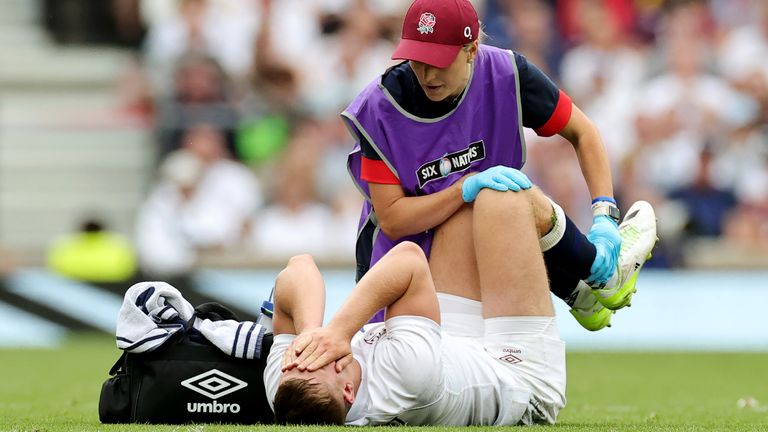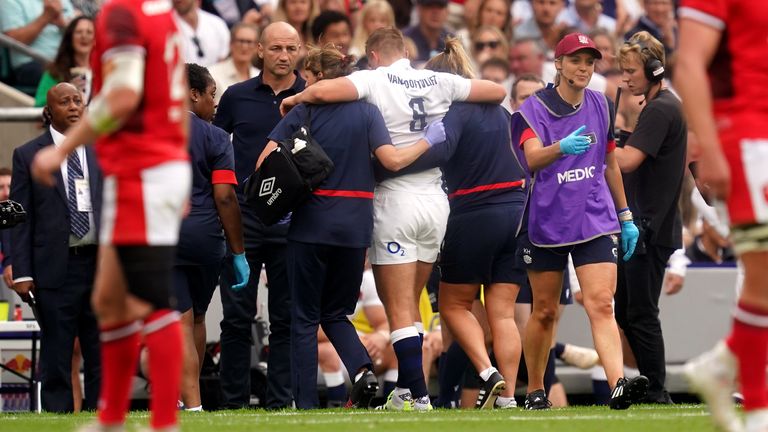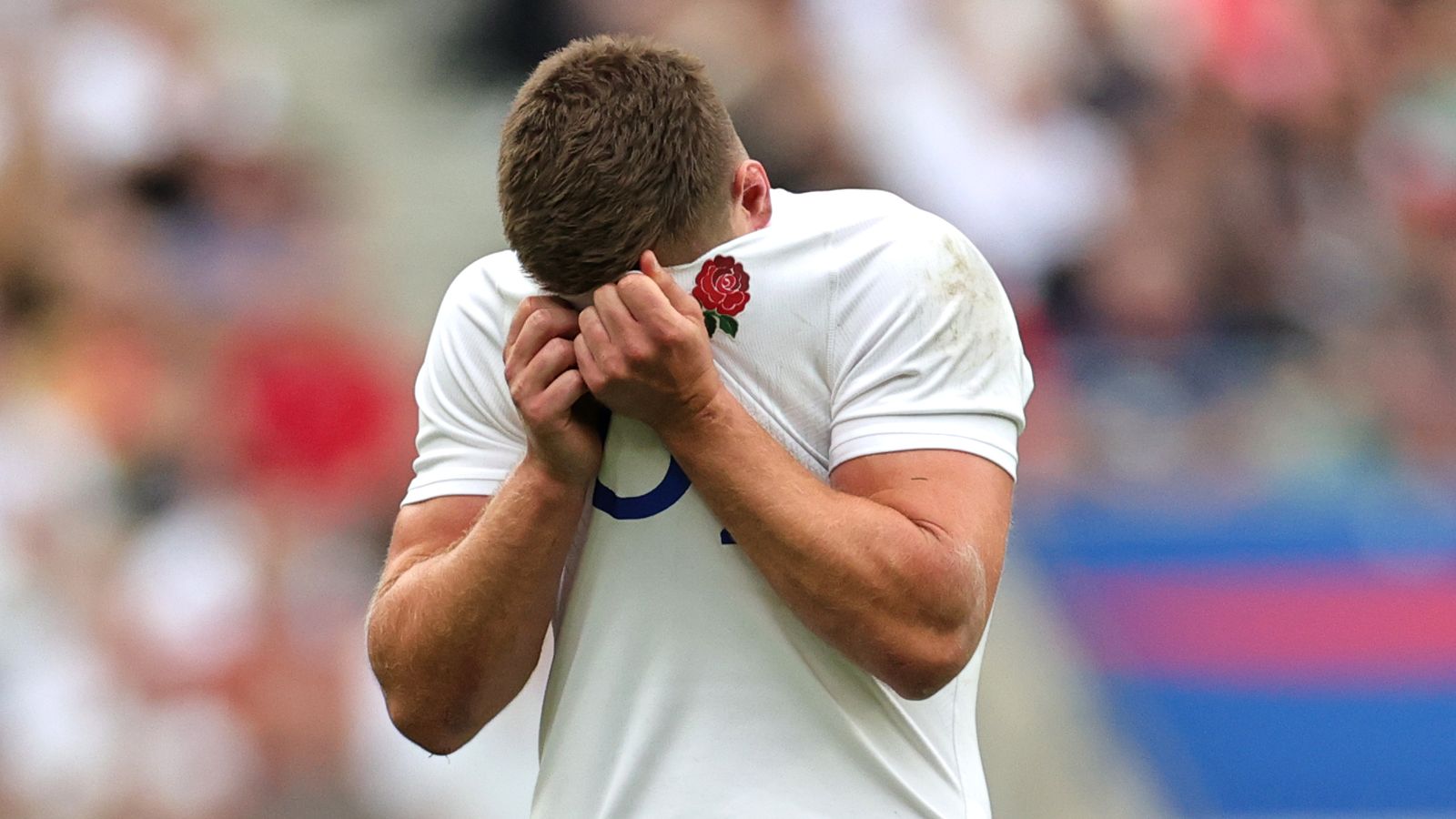
England skipper Owen Farrell faces a World Cup suspension as one of a number of concerns for Steve Borthwick from Saturday’s Test
England secured victory from the jaws of defeat at home to Wales in their latest Rugby World Cup warm-up clash, but they emerge from it with more negatives than positives.
George Ford’s penalty with four minutes to go saw England pip Wales 19-17 from a position of 17-9 behind, but only after three sin-binnings and a red card to skipper Owen Farrell.
Disciplinary issues and Farrell’s dismissal may be the headline, but there were several other concerns from the day for England head coach Steve Borthwick too.

England head coach Steve Borthwick will come away from Saturday’s Test with a lot of concerns
A skipper and starting 10 missing from the World Cup in Farrell?
Since Borthwick has been instilled as England’s lead man, he has designated Farrell very much as his own main man. Both at fly-half, and in terms of captaincy.
Yet, the 31-year-old’s red card against Wales at Twickenham for a now customary shoulder-led high shot – catching back-row Taine Basham in the face on this occasion – will prove costly and likely see him miss at least some of England’s Rugby World Cup pool schedule in France.
With their two main Pool D clashes vs Argentina and Japan happening to be their opening two games, it is somewhat of a disaster for Borthwick and co.

England skipper Farrell was sent from the field of play at Twickenham for a high tackle
Farrell, regrettably, has a good deal of previous in this area. And for that reason, he is likely to receive no mitigation for whatever sanction is handed out. Indeed, this is will now represent Farrell’s fourth such ban for a high tackle.
In 2016 he was suspended for two games for an illegal challenge on Wasps’ Dan Robson during a Champions Cup semi-final, while in 2020 he was banned for five games for a high tackle on Wasps player Charlie Atkinson – a sanction which was reduced from 10 weeks on account of off-field mitigating factors.
Earlier this year in January, he received a four-game ban after his shoulder made contact with the head of Gloucester replacement Jack Clement.

This will be the fourth high tackle incident Farrell will cop a suspension for
Farrell also avoided a citing in November 2018 for a shoulder charge high to the chest of South Africa centre Andre Esterhuizen while playing for England, as the offence was deemed worthy of a yellow card and not red. Farrell avoided a sin-binning for the incident during the Test as England held on to win by a point, 12-11.
It’s difficult to imagine a player Borthwick would have preferred to lose less than his on-pitch leader Farrell.
Ankle injury puts starting scrum-half Van Poortvliet’s World Cup in doubt
The other major concern for Borthwick coming out of this game was the serious-looking ankle suffered by scrum-half Jack van Poortvliet in the first half.
The 22-year-old has been the England head coach’s first-choice scrum-half since he got the post, starting Van Poortvliet in all five Six Nations Tests earlier this year.

England scrum-half Jack van Poortvliet appears to have suffered a serious ankle injury
But his injury on Saturday looked more than a mere ankle roll, as he stayed down for a lengthy period of time, had a spell of treatment with head in hands, and then had to be helped off by two medics either side of him, unable to bear any weight on the affected leg.
With England’s World Cup opener exactly four weeks away, Van Poortvliet’s injury appears a cruel twist of unfortunate timing for the player, and a real headache for the coaching staff.
“With Jack van Poortvliet, he’ll get a scan. Rather than jump to any conclusions, we’ll wait and see what happens,” Borthwick said post-match, in hope rather than expectation one imagines.

Van Poortvliet had to be helped off the pitch by England medics, four weeks from the World Cup
Might Borthwick have lost his starting England half-back pairing for the World Cup clash against Argentina on the same August evening? It would appear he has.
England’s scrum display a huge cause for concern | Abysmal discipline | Handling errors aplenty
England were facing a Wales side who, before victory over England in Cardiff last week, were one of the worst performing sides in Test rugby.
The Six Nations saw them finish fifth, a year on from finishing fifth in the 2022 Six Nations and losing at home to Italy for the first time. The autumn saw them ship 55 points vs the All Blacks at home, and even lose at home to Georgia.
They have lost a host of experienced stars and confidence was on the floor.
Bearing all that in mind, England were four minutes away from losing to them home and away in successive weeks.

England’s attack failed to fire again vs Wales, while their discipline was extremely poor as they were shown four cards
On Saturday, the scrum in particular was a real problem area, and evoked memories of the 2019 World Cup final in many ways, when England were annihilated in that specific aspect by South Africa, and would lose heavily as a result.
Facing an unheralded Wales pack, England conceded four penalties and a further free-kick at the scrum, and ended up losing the experience of Ellis Genge to the sin-bin as a result of scrum issues.
Genge’s departure was one of four cards handed out to England – an unsustainable situation going into a World Cup campaign – as wing Henry Arundell was sin-binned for stopping a quick-tap, and Freddie Steward was yellow carded for taking Josh Adams out in the air, conceding a penalty try and fortunate to avoid a red card and be removed permanently as Farrell was.

Full-back Freddie Steward conceded a penalty try for taking Josh Adams out in the air, and was lucky not to be red carded
As was the case last week in Cardiff, England’s attack failed to click and fire for the entire 80 also, with their only try coming via a maul and with the side farcically reduced to 12 players.
Granted, the side deserve credit for forcing a victory they should never have achieved from 17-6 behind, with the yellow cards and red card dished out to them. But, this was a game they were heavily tipped to win pre-match, as Wales made 15 changes.
Handling errors and knock-ons were widespread, with England conceding 10 turnovers in the clash, to sit alongside the 12 penalties they shipped.

Knock-ons and handling errors were rife within England’s performance
Perform the same way in Dublin next weekend, and it’s safe to say they will not come out with victory. A victory on Saturday which, though it made the fans happy, arguably left more negatives and questions to answer than positives.


